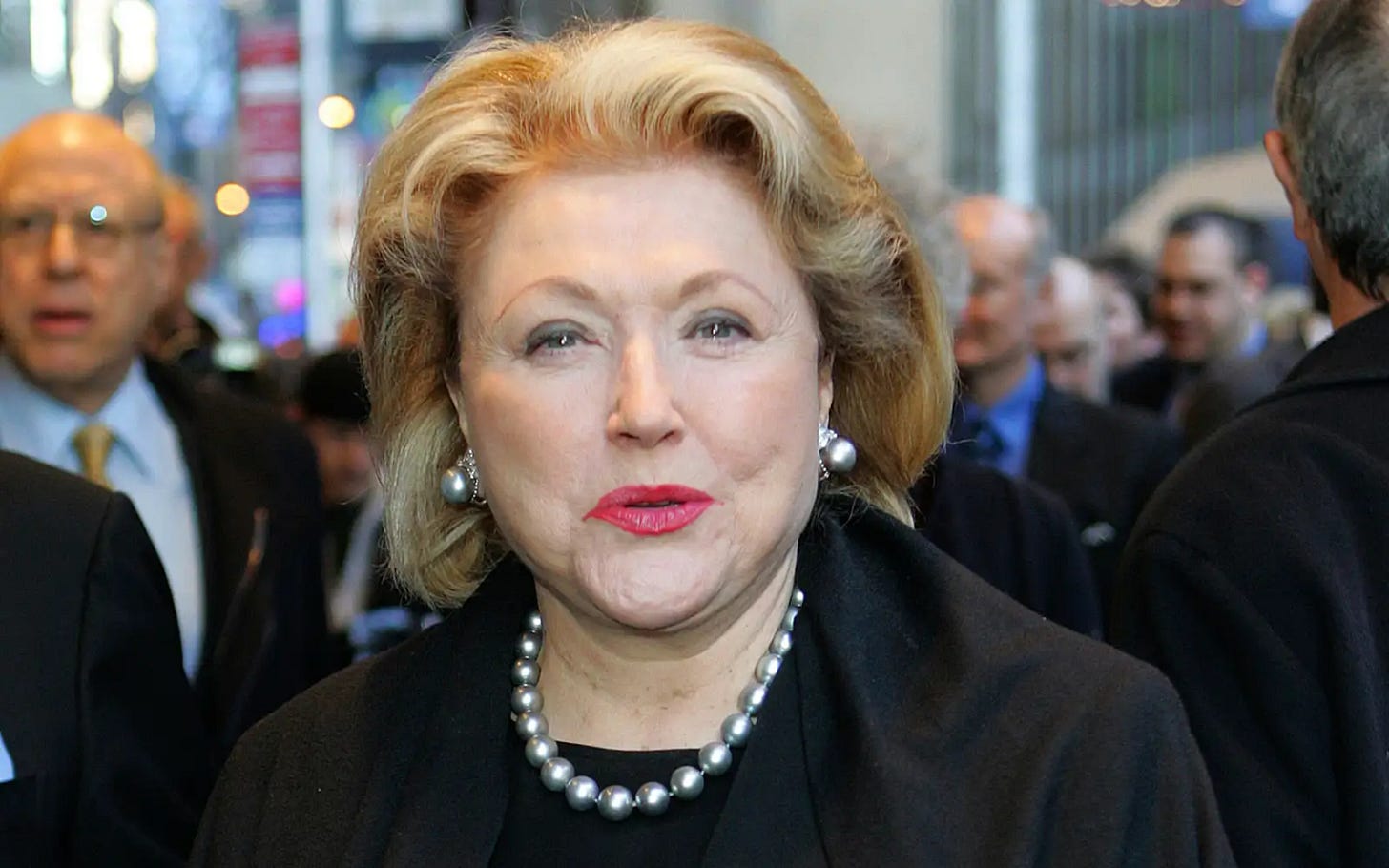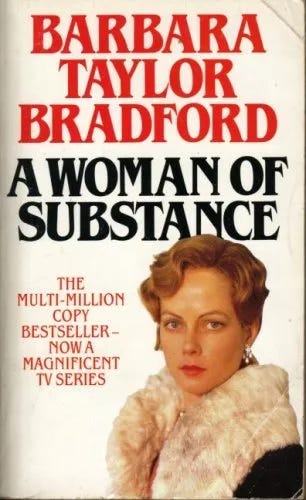Welcome to A Narrative of Their Own, where I discuss the work of 20th century women writers and their relevance to contemporary culture.
If you enjoy reading essays on literature as well as monthly reviews of great books and recommended reading, please consider a free or paid subscription.
I was sad to hear of the death of the novelist Barbara Taylor Bradford last week at the age of 91.
I first came to her work through the 1984 mini-series of her book A Woman of Substance, which I remember first watching in the late 80’s as a teenager. I later picked up the book as I’d enjoyed watching it so much, and ended up working my way through the whole series in my later teens, although it was this first installment that really captivated me as a young girl growing up in Yorkshire.
Written in 1979, A Woman of Substance tells the story of Emma Harte, as remembered by Emma as an older woman reflecting back on her life, as she discovers that two of her sons are planning to force her to retire and sell off the pieces of her company.
Emma is flying with her favourite granddaughter Paula, whom she plans to install as her replacement of Harte Stores, a retail company she started in Yorkshire back when she was a young, impoverished single mother in the nineteenth century.
The story then takes us right back to Emma as she takes a job as a servant at Fairley Hall, a large Yorkshire estate, where her father and two brothers also work. One brother, Winston, soon leaves for the navy however following the death of their mother.
Emma is hard-working and becomes friends with Edwin, the younger son at Fairley Hall, bonding with him over the death of their mothers, as well as becoming friends with Blackie O’Neill, an Irish man who is also working at the Hall. Slowly becoming more than just friends with Edwin, Emma falls pregnant with his child, but when Edwin refuses to tell his family and marry her, she runs away to Leeds to avoid the gossip and ruining her family.
She gains employment in a clothing workshop and takes to the work well and is introduced to a friend of Blackies, who needs someone to share a house with her, moving in and becoming great friends. She also gains a second job following the birth of her daughter, Edwina, whom she leaves in the care of a cousin whilst she works to make a life for them.
After a couple of years, she has enough money saved to open her own shop, but after a violent altercation with Edwin’s brutish brother Gerald, where she refuses to give him the whereabouts of Edwin’s child, she decides to marry a man who has been friendly to her, as a form of protection, and they have a son together.
In true saga style, the book moves through various disappointments and griefs for Emma, such as the death of her husband in the Battle of the Somme, the death of Blackie’s wife in childbirth, causing Emma to take in their child, and the truest love affair of her life with Paul McGill, a member of the Australian army.
After Paul returns to Australia, she remarries, births twins, and endures an unhappy marriage. Eventually, Paul returns, but more grief and heartbreak trouble Emma, further hardening her resolve to care for her children and build her empire alone.
Her children begin having their own children, and the book culminates in 1968, when Emma gathers her family to her home in Yorkshire, informing them that she is aware of their treachery against her. She has cunningly changed her will, leaving the older children furious.
The book ends with her granddaughter Paula set to take over the business. Paula has also begun a relationship with Jim Fairley, Edwin’s grandson, and Emma confirms to Jim that her own daughter Edwina is his aunt. Jim also has a surprise in store for Emma that takes her right back to the beginning, to her own mother’s legacy and her friendship with Edwin. The book has come full circle, as Jim relays to Emma the ways in which the Fairleys and the Hartes have always endured brief but tragic relationships. It was his grandfather Edwin’s wish for he and Paula to change this history.
The book explores the themes of overcoming obstacles and hardships, the loss of enduring love, and dealing with life’s disappointments. These tropes are used to shape Emma’s character and develop a great deal of fortitude within her. The book also looks at how success and greed- as well as the overarching theme of revenge- can consume a life as well as those closest to them.
The book went on to become one of the best-selling books of all time, selling over 30 million copies and being adapted into the 1984 mini-series starring Jenny Seagrove as the young Emma Harte and Deborah Kerr as the aged business tycoon.
There are seven books in the whole saga of Emma Harte and her family, eventually spanning three generations of her descendants as they inherit her business and find their own way. The second and third in the series were also made into TV mini-series’.
Born in 1933 in Upper Armley, Leeds, West Yorkshire, Bradford was not born into a rich family but, being the only child of doting parents (her older brother died before she was born), she confessed to being a pampered child. She continued to enjoy the finer things in life into her adulthood, and was often recognised for being bedecked in designer clothes and jewellery.
Initially working for the Yorkshire Post as a typist, she eventually became a reporter, becoming editor of the Woman’s Page, and later a columnist on the London Evening News.
Attempting to write suspense novels, Bradford decided to try her hand at family saga’s in her thirties, when she sold the proposed as yet unfinished novel A Woman of Substance to a publisher.
"All I know is that I wrote the kind of story I love to tell about an ordinary woman who becomes extraordinary in living her life a certain way and goes out to conquer the world."
Bradford went on to write more than thirty books in total, all bestsellers. Many of these were similarly epic family sagas, some made into further films and TV series. The author claimed to prefer to write all her books long-hand, and stated that she never encountered writer’s block. Very much like Emma Harte and her other female heroines, the writer claimed to be made of steel, ‘stoical and strong’.
“They're all driven, ambitious and disciplined. I've written about myself in every book.”
Although she sometimes wrote about male protagonists, her talent was for capturing the strength and determination of women fighting to succeed.
Although it is many years since I first read Bradford’s epic family saga of the Harte family, as soon as I began reading of her death, I was taken back to that first encounter. I haven’t read a family saga style book in many years, and my reading tastes have changed and adapted over that time.
However, I think sometimes we can hold a certain bias towards the kind of books Bradford wrote. They are perhaps not ‘fashionable’ anymore, and I think that their bestseller status can often connote a less-than high-brow snobbery towards them.
But I think it’s important to return to the books we encounter at different stages on our journey as readers. In my opinion, our reading lives are all the richer for it.
If you’re new around here, I usually write about all things women literature related. My paid subscribers also receive a monthly review of great books and recommended reading. Why not avoid the Black Friday nonsense and support an independent writer instead? Your support helps keep this newsletter afloat!







So sad--truly a wonderful writer. The Woman of Substance books were some of the first I read as a young adult and I adored them. I never saw any of the movies based on her books, but I read all of them that I could over the years.
She’s a great example of the glory of high/low and the empty folly of literary snobbery. There are times when story is all.